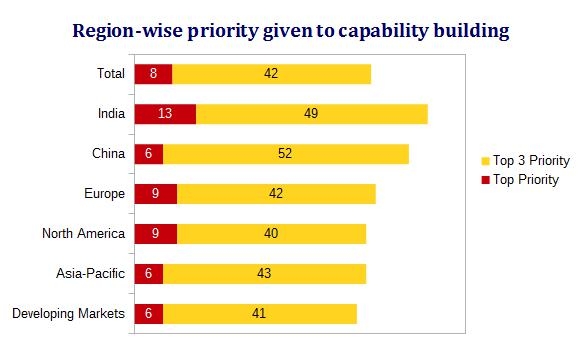McKinsey & Company’s follow-up study reveals that most companies continue to use traditional capability-building methods, even though their needs have evolved…
More corporate employees in India and China, in comparison to their global counterparts, realise the importance of development of organisational and individual capabilities. Recently, management consulting firm, McKinsey & Company, did a follow up to their 2010 study on organisational capability-building.
The report revealed that 62 per cent of respondents in India and 58 per cent in China, claimed that organisational capability-building was top priority for them. This was higher than the global average of 50 per cent. Even for Europe and North America, the figure stands at 51 per cent and 49 per cent, respectively. Five years back, only 20 per cent of respondents in India and 16 per cent in China had listed this as top priority.
With an increasing number of growing companies, India and China are believed to be facing significant capability gaps as their companies expand. This is the reason why more Indian and Chinese companies prioritise skill development.
The report stated that while the capability needs of companies have evolved globally, their capability-building methods have not kept pace with the demand.
Most companies still employ the same traditional tools, like on-the-job training. Offsite learning programmes, mobile learning exercises and group-based online courses are still to be explored as means of skill development by most companies.
It is seen that companies prefer to focus on enhancing the competency of individual employees who are important for the organisation’s growth than on the overall development of all employees. When it comes to employee groups, companies put the frontline staff on top of the priority list followed by senior leadership. Technical staff and frontline supervisors are placed at the bottom of the list.
To remain relevant, companies need to look at the long term. They not only need to integrate sustaining capabilities but also link learning to company performance for their capability-building programme.
 Enhancement of institutional and individual capabilities is given priority on the basis of two factors —customer demand and matters of strategic importance. The third significant factor is the need to match up to the capabilities of competitors.
Enhancement of institutional and individual capabilities is given priority on the basis of two factors —customer demand and matters of strategic importance. The third significant factor is the need to match up to the capabilities of competitors.
One of the biggest hindrances in adopting capability development measures has been the absence of a credible metrics for evaluation of the impact of skill development on business growth. Very few companies have been observed to have a robust approach to the assessment of their current capabilities and identification of skill gaps. Instead of a scientific approach, internal assessments are still the preferred methods for identification of capability needs.
Lack of a clear vision and resources are the other reasons why companies are not so enthusiastic about capability development. Interestingly, organisations’ resistance to change and willingness to try new methods have been on the decline since 2010, at the global level.
The demand for capability-building was given importance in the 2010 study as well, but in 2014, the respondents said there were changes in capability-related needs and challenges.
Most respondents believed that the biggest contributor to a company’s business performance was leadership skills followed by functional capabilities. Executives ranked skills in strategy, operations, sales and marketing as the most important to business performance.
The latest survey covering executives from all regions, sectors and company sizes has found that there is a need to focus on different sets of skills, tools and systems and different sets of employees in order to retain competitive edge.



